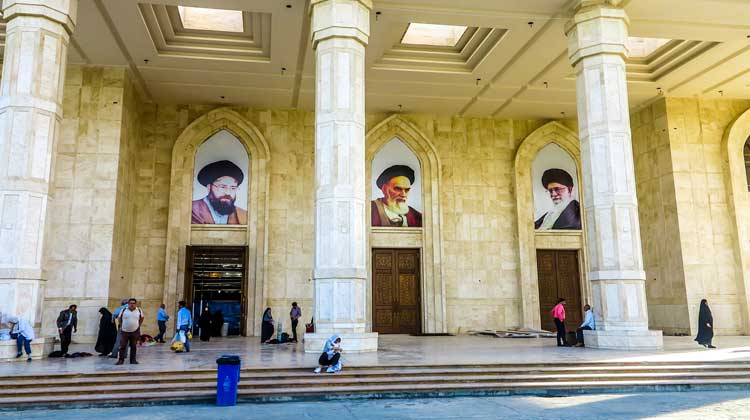Hojjat ol Eslam Embrahim Raisi, tapped in March to head Iran’s judiciary, is now considered the favorite to be the next Iranian supreme leader, according to an American Enterprise Institute report released in June.

Prior to his judicial appointment by Supreme Leader Ayatollah Ali Kahmenei, Raisi was custodian and a chairman of Astan Quds Razavi, a “bonyad” that oversees the Imam Reza Shrine. Though some consider bonyads Iranian charitable institutions, report author Mike Saidi noted their role as “enormous holding companies for the regime.”
“Raisi’s increasing prominence and power call for a study of his actual power base,” the report stated. “An examination of Astan Quds Razavi’s holdings reveals its close connections with the Islamic Revolutionary Guard Corps (IRGC) and the scope of Raisi’s potential power base and influence in the coming contest to follow Khamenei.”
Astan Quds Razavi was also a fertile training ground for Raisi.
“Raisi’s time at the helm of the Astan Quds Razavi provided him with significant leadership experience,” the report stated. “More importantly, Raisi gained invaluable experience in the direct management of an enormous economic empire.”
Razavi Economic Organization (REO)—the economic sector of Astan Quds Razavi—holds companies in mining, pharmaceuticals, food production, and more, according to the report.
“Khamenei accordingly retains tight control over the leadership and performance of Astan Quds Razavi,” the report continued. “An auditing company under the Office of the Supreme Leader currently functions as the chief inspector and official auditor for an overwhelming number of Astan Quds Razavi’s subsidiary companies.”
The report also asks whether sanctions against Astan Quds Razavi are warranted.
“U.S. designations have overwhelmingly focused on targeting the IRGC Quds Force and IRGC affiliates more than bonyads not obviously controlled by the IRGC,” the report stated. “Astan Quds Razavi is an interesting example of an organization that might merit an exception to this targeting focus.”
One of the latest moves against an IRGC affiliated bonyad was in late 2018 when the U.S. Department of the Treasury sanctioned “a vast network of business providing financial support to the Basij Resistance Force (Basij), a paramilitary force subordinate to Iran’s Revolutionary Guard Corps (IRGC).”
The report went on to explain that the sanctions had to do with the violations of human rights and abuses—something for which Raisi also has been criticized for.
Writing for National Review in September 2018, Tzvi Kahn, a senior Iran analyst for the Foundation for Defense of Democracies, documented Raisi’s long connection to the Iran judiciary and his actions over nearly 40 years.
“As a prosecutor between 1980 and 1994, he routinely sought draconian punishments for political opponents of the regime,” Kahn wrote. “As a deputy chief justice from 2004 to 2014, he personally approved death penalties for scores of alleged offenders.”
He added that “the number of executions gradually rose every year, from approximately 100 to nearly 1,000” between 2004-2015.
Personal Relationships
Another advantage that Raisi holds to becoming the potential next supreme leader is his relationship with Khamenei.
In 1979, Raisi attended the Qom Haqqani School, the same alma matter of Khamenei. Since the end of seminary, Raisi and his father-in-law Ayatollah Ahmad Alam ol Hoda have continued to be loyal supporters of Khamenei throughout his political career.
In the 2017 presidential election, Raisi ran for the Combat Clergy Association (CCA). Raisi, who has been described as a “hardline cleric,” was supported by Khamenei. Despite garnering support from the supreme Leader, Raisi lost the election to Hassan Rouhani of the Moderation and Development Party.
During the election, Raisi ran on a platform that supported sex segregation, populism and a resistive economy.
Despite garnering support from Khamenei, Raisi has faced opposition, most notably from the Center for Human Rights in Iran.
“The selection of Raisi to serve as head of judiciary will send a clear message,” Haidi Ghaemi, the Center for Human Rights executive director told iranhumanrights.org. “The rule of law has no meaning in Iran, and those who participated in mass murder will be rewarded.”
Constitutional Favor
Not only does Raisi have advantages through personal relationships and experience, a report from the Atlantic Council noted an excerpt from Iran’s amended constitution that supports him taking over the position:
“In order to fulfill the responsibilities of the judiciary power in all of the judicial, administrative, and executive matters, the leadership designates for a period of five years a just scholar of jurisprudence (mujtahid), who is knowledgeable of judicial matters and is a competent administrator as the head of the judiciary power: the supreme position in the judiciary power.”
Raisi graduated from Shahid Motahari University with a Ph.D. in jurisprudence and fundamentals of Islamic law. He has served in numerous judicial positions, including the Attorney General of Iran and First Vice Chief Justice of Iran.
Other candidates
Raisi, however, isn’t the only potential candidate to take over the Iranian Supreme Leader position.
In March, The Washington Post cited additional candidates that included Khamenei’s son Sayyed Mojtaba Hosseini Khamenei and Ayatollah Sadeq Larijani.
During seminary, Hosseini studied under Mahmoud Hashemi Shahroudi, who served as a chairman of the Expediency Discernment Council before dying in 2018.
Sadeq Larijani, a conservative cleric, currently serves as the chairman of the Expediency Discernment Council and was appointed by Khamenei. In 2009, Khamenei appointed Larijani as the Chief Justice of Iran.
Trenton Abrego is a staff writer for Homeland411.com.
© 2019 Homeland411
Please subscribe to the Homeland411.com electronic newsletter.